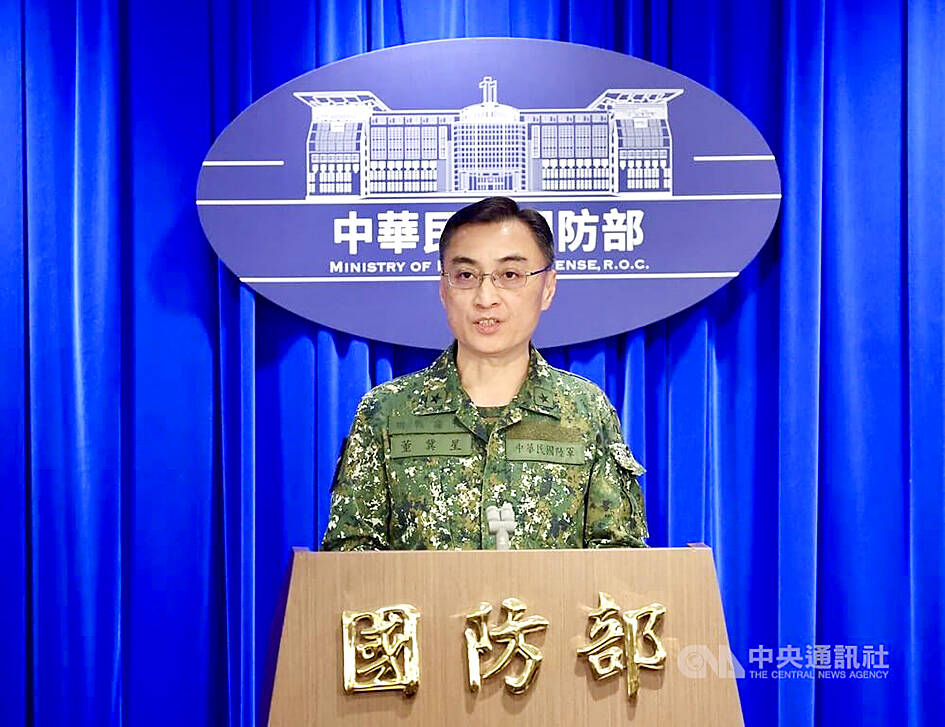Taiwan’s largest-scale annual military drills, the Han Kuang exercises, would be lengthened this year to include two weeks of computerized tabletop wargames and 10 days of live-fire drills, the nation’s armed forces announced yesterday.
The Han Kuang exercises are held annually in two stages.
This year’s 41st edition is to kick off with tabletop war games, conducted from Saturday to April 18, said Major General Tung Chi-hsing (董冀星), director of the joint operations planning division under the Ministry of National Defense.

Photo: CNA
The 14-day computer-aided wargames are reportedly the longest ever.
Last year the tabletop war games were held for eight days, while in previous versions computerized exercises usually lasted five days.
According to Tung, the computerized wargames would be conducted using the US-built Joint Theater Level Simulation platform.
Those simulations would be held around the clock for two weeks to test the ability of military personnel to coordinate and respond to a Chinese invasion, he said.
The wargames are to simulate a scenario whereby the Chinese People’s Liberation Army (PLA) unexpectedly pivots military exercises or “gray zone” activities — provocative or aggressive actions that fall just short of an open conflict — near Taiwan into a real attack, the one-star general said.
Meanwhile, the live-fire component of the Han Kuang exercises is to run from July 9 to 18, featuring personnel from all branches of the armed forces on Taiwan and its offshore islands, he said.
The 10-day live-fire exercises around the country would also be longer than earlier iterations, which previously lasted five days.
As last year, this year’s live-fire segment of the exercises would again be unscripted to test troop emergency response capabilities, with a focus on testing troop responses to decentralized command and 24/7 operational scenarios, Tung added.
The wargames and live-fire segments of the Han Kuang exercises would also include newly acquired uncrewed aerial vehicles, M1A2T tanks, M142 High Mobility Artillery Rocket Systems and Harpoon Coastal Defense Systems to test these new additions to the nation’s defensive capabilities, Tung added.
Minister of National Defense Wellington Koo (顧立雄) said last month the decision to significantly lengthen this year’s Han Kuang exercises is meant to more thoroughly test the armed forces’ “joint operation planning and execution.”
The live-fire component is to see the culmination of months-long Urban Resilience Exercises that are being held from this month to July, which combine the Wan An air raid drills and Min An disaster response drills, in 11 counties and cities around the country, Tung said.
The Urban Resilience Exercises allow central government ministries and agencies and local governments to coordinate and work together to enhance overall local resilience and response capabilities, he said.
Such efforts were launched under the Whole-of-Society Defense Resilience Committee, an advisory group established by the Presidential Office.
The committee has pledged to enhance Taiwan’s resilience by training civilian forces, securing strategic and critical supplies, reinforcing energy and key infrastructure, and ensuring the continued operation of medical, transportation, information and financial facilities.
The annual Han Kuang exercises, which have served as Taiwan’s major war games since 1984, consist of live-fire drills and computerized war games and seek to test Taiwan’s combat readiness in the face of a possible Chinese invasion.

The manufacture of the remaining 28 M1A2T Abrams tanks Taiwan purchased from the US has recently been completed, and they are expected to be delivered within the next one to two months, a source said yesterday. The Ministry of National Defense is arranging cargo ships to transport the tanks to Taiwan as soon as possible, said the source, who is familiar with the matter. The estimated arrival time ranges from late this month to early next month, the source said. The 28 Abrams tanks make up the third and final batch of a total of 108 tanks, valued at about NT$40.5 billion

Two Taiwanese prosecutors were questioned by Chinese security personnel at their hotel during a trip to China’s Henan Province this month, the Mainland Affairs Council (MAC) said yesterday. The officers had personal information on the prosecutors, including “when they were assigned to their posts, their work locations and job titles,” MAC Deputy Minister and spokesman Liang Wen-chieh (梁文傑) said. On top of asking about their agencies and positions, the officers also questioned the prosecutors about the Cross-Strait Joint Crime-Fighting and Judicial Mutual Assistance Agreement, a pact that serves as the framework for Taiwan-China cooperation on combating crime and providing judicial assistance, Liang

A group from the Taiwanese Designers in Australia association yesterday represented Taiwan at the Midsumma Pride March in Melbourne. The march, held in the St. Kilda suburb, is the city’s largest LGBTQIA+ parade and the flagship event of the annual Midsumma Festival. It attracted more than 45,000 spectators who supported the 400 groups and 10,000 marchers that participated this year, the association said. Taiwanese Designers said they organized a team to march for Taiwan this year, joining politicians, government agencies, professionals and community organizations in showing support for LGBTQIA+ people and diverse communities. As the first country in Asia to legalize same-sex

MOTIVES QUESTIONED The PLA considers Xi’s policies toward Taiwan to be driven by personal considerations rather than military assessment, the Epoch Times reports Chinese President Xi Jinping’s (習近平) latest purge of the Chinese People’s Liberation Army (PLA) leadership might have been prompted by the military’s opposition to plans of invading Taiwan, the Epoch Times said. The Chinese military opposes waging war against Taiwan by a large consensus, putting it at odds with Xi’s vision, the Falun Gong-affiliated daily said in a report on Thursday, citing anonymous sources with insight into the PLA’s inner workings. The opposition is not the opinion of a few generals, but a widely shared view among the PLA cadre, the Epoch Times cited them as saying. “Chinese forces know full well that